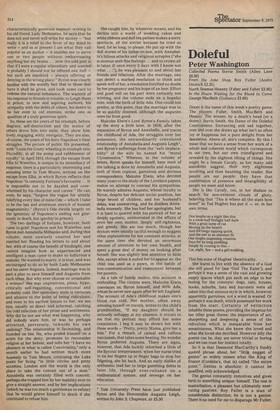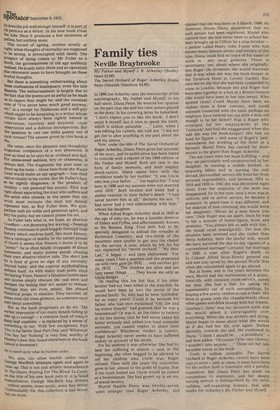Doleful
Peter Washington
Collected Poems Stevie Smith (Allen Lane
£8.50)
From the Joke Shop Roy Fuller (Andre Deutsch £2.25) North Seamus Heaney (Faber and Faber £2.95) In the Hours Waiting for the Blood to Come George MacBeth (Gollancz £2.60)
Doom is the name of this week's poetry game. The players: Fuller, Smith, Macbeth and Heaney. The winner, by a death's head (or a dozen): Stevie Smith, the Dame of the Doleful Countenance. Entrancing and sad together, over and over she draws up what isn't so often joy or happiness but a pure delight from her desolation. Above all, she's complete. By this I mean that we have a sense from her work of a whole and coherent world which corresponds to our own, but our own transfigured and revealed by the slightest tilting of things. She might be a female Cavafy, as her many odd anecdotes suggest, their very slightness involving and then haunting the reader. Her people are our people: they have that combination of presence and intangibility of people we meet and know.
She is like Cavafy, too, in her disdain to search for non-existent clouds of glory,
believing that "This is where all the stars bow down" as Ted Hughes has put it — or, in her
own terms:
One laughs on a night like this
In a room half firelight half dark With a great lump of cat Moving on the hearth And the twigs tapping quick, And the owl in an absolute fit One laughs supposing creation Pays for its long plodding Simply by coming to this — Cat, night, fire — and a girl nodding.
This has none of Hughes' theatricality.
She learnt to live with the absence of a God she still pined for (see 'God The Eater'); and perhaps it was a sense of the vast and growing empty spaces which put such an edge to her feeling for the concrete: dogs, cats, houses,
books, suburbs, hats and baronets were all taken into that sinuous style in which, however apparently garrulous, not a word is wasted. Or perhaps it was death, which possessed her work from the start. Certainty of extinction inhabits these poems, providing the impetus for her other great theme: the importance of art; sharpening and deepening a sense of the ridiculous which is inseparable from her sensuousness. What she knew she loved and what she loved she decribed. However silly the poems can be, they are never trivial or boring and we can trust her instinct totally.
So it is that Desmond MacCarthy's fondly quoted phrase about her "little nugget of genius" so widely misses what the King of France (Cordelia's, that is) called "the entire point." Genius is absolute: it cannot be qualified, only acknowledged.
The genius constantly conceives and gives birth to something unique: himself. The rest is
masturbation, a pleasant but ultimately enervating pastime. Roy Fuller is a man of
considerable distinction; he is not a genius. There is no need for me to disparage Mr Fuller, he does the job well enough himself: it is part of his persona as a writer. In his new book From the Joke Shop it produces a few moments of Pathos , but nothing more. This record of ageing, written mostly at night, when thoughts of mortality are supposed to be strong, is preoccupied with death. The prospect of dying comes to Mr Fuller as a Shock, the grotesqueness of old age suddenly realised. He is only sixty-three and an operation Plus retirement seem to have brought on these morbid thoughts.
• But there is something embarrassing about these confessions of inadequacy; even the title disarms. The embarrassment is largely due to the fact that the poems are as awful as he leads us to expect they might be; and the constant note of "I've never been much good anyway, etc." is a receipt for flabbiness and a self-pity Which ought to be surprising in a writer whose virtues have always been rightly named as reservation, courtesy and wryness, close observation and a dubious introspection. But the question is: can one write poetry out of Such virtues? The answer given by this book is No.
His verse, once the pleasant and thoughtful Augustan companion of a wet afternoon, is now as tired as he says he is: civilised and dull. For unleavened sadness, wry or otherwise, is always dull. The fragments the poet uses to Shore up his ruins — those lines from the Waste Land would make an apt epigraph — lose their native vitality in his verses. But Mr Fuller's fate, as he rightly diagnoses; is the product of timidity — not personal but artistic. Eliot was right about separating the man who suffers and the artist who creates, in the sense that the artist must recreate the man not merely represent him, as Roy Fuller does. We sympathise with his noble and generous spirit, and Pity his pains; but we cannot praise his art.
As Fuller bids what is, we hope, an abortive Goodbye — not drowning but waving — Seamus Heaney continues to plod boggily through Irish history which resolves itself, like most history, Into a catalogue of deaths. In the earlier poems :af North it seems that Heaney's doom is to be 'Poetic": he is often fatally incapable of direct statement; and many poems perish chasing their own allusive/elusive tails. The short line he is fond of gives no sign of any necessity beyond habit; and the copious mythologising defeats itself. As with many Irish poets since the boring Yeats, Heaney's fabulous landscapes and stories simply obscure the real ones and dampen the feeling they are meant to release. Perhaps they are even meant, like absurd theatrical props, to alienate. They succeed. At tunes even the trees grimace, as someone once said about something. But as the book progresses so do we. The earlier impression of too many details failing to add up to enough — a common fault of today's dalsY-leaf counters — is replaced by a sense of something to say. With few exceptions, Part Two is far better than Part One, and 'Whatever You Say Say Nothing' is very fine, worthy of Heaney's best line, found elsewhere in the book (about a drummer):
He is raised up by what he buckles under.
We, alas, too often buckle under what George MacBeth attempts again and again to raise up. This is not just artistic masturbation In The Hours Waiting For The Blood To Come, as the title of his new book puts it: it is failed masturbation. George MacBeth has Written
:cellent poems, some erotic, some fine drivel. Unmistakably his, this collection is bad drivel. SaY no more.



































 Previous page
Previous page